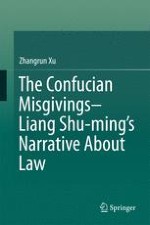2017 | OriginalPaper | Buchkapitel
8. The Road to Constitutional Government in China
verfasst von : Zhangrun Xu
Erschienen in: The Confucian Misgivings--Liang Shu-ming’s Narrative About Law
Verlag: Springer Singapore
Aktivieren Sie unsere intelligente Suche, um passende Fachinhalte oder Patente zu finden.
Wählen Sie Textabschnitte aus um mit Künstlicher Intelligenz passenden Patente zu finden. powered by
Markieren Sie Textabschnitte, um KI-gestützt weitere passende Inhalte zu finden. powered by
